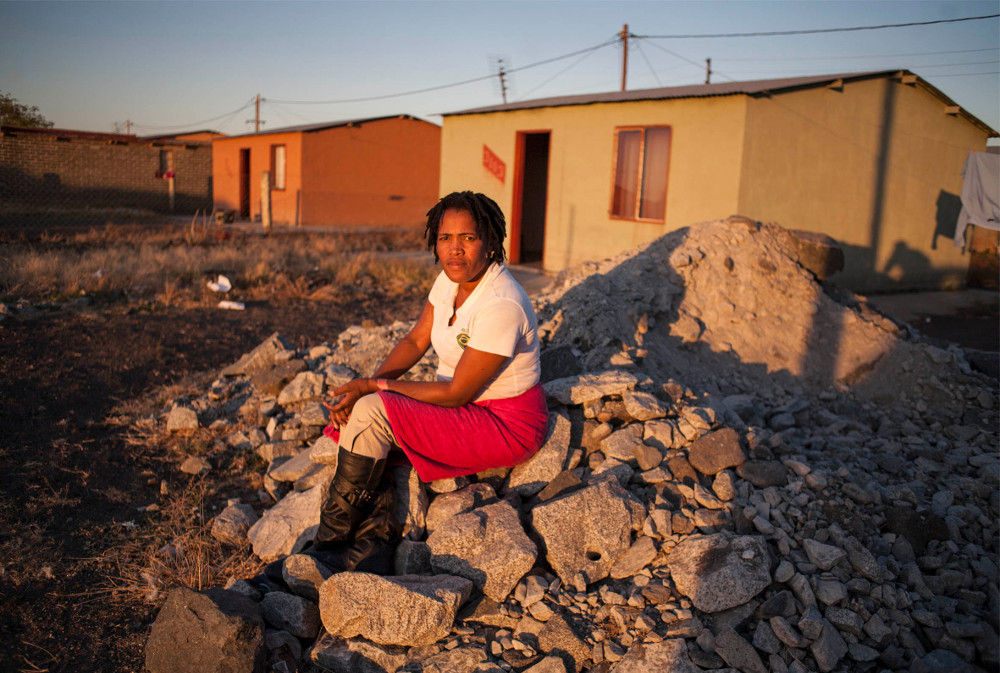As the strike on the platinum belt stretches into its fifth month, officials from the South African Social Security Agency (Sassa) have started handing out food vouchers to hungry miners this week. Some people are spending the whole night in the queue.
Hawker Ameliah Mofokeng says she is no longer able to support herself because striking miners outside Rustenburg can’t afford to shop at her stall anymore.
The dreadlocked 46-year-old mother of two said she used to sell apples and bananas outside her RDP house near Impala Platinum Mine One Shaft, 15km outside of Rustenburg, but her customers “can’t afford to buy a R1.50 apple”.
Miners have now been on strike for five months. On January 23 they stopped work, demanding a R12 500 monthly salary. Their representatives – the Association of Mineworkers and Construction Union (Amcu) – and the three mining companies Lonmin, Amplats and Impala have yet to reach an agreement.
Mofokeng’s house in Freedom Park looks on to the blue-and-white marquee from which five Sassa officials are handing out food vouchers.
Food vouchers
The strikers have to apply for the food vouchers, worth R450, which they can exchange at local stores such as Boxer or Spar. Those queuing have their clock cards with them, along with a bank statement and their IDs.
The official writes down this information on a form, and hands the striker a slip of paper. But progress is slow. Workers queue on plastic chairs inside the tent while outside a line of about 20m – some people standing, some sitting on the ground – stretches away from the tent.
One man carrying a plastic bag from Boxer says his groceries – dried beans and mielie meal – will last him and his family a week.
Mofokeng is unemployed and seems despondent. “I don’t know whether or not I am going to have supper. The Sassa officials only give food vouchers to the mineworkers and not to community members who are also suffering,” she says.
“I am HIV positive and I am forced to take my tablets once a day because I don’t have enough food to eat before taking them. I tried taking them without food the other day and vomited afterwards.”
Tuck shop looting
She says a group of community members stormed tuck shops owned by foreign nationals last week and looted their stock. The traders have now locked their shops and fled.
Mofokeng used to rent her garage to Somali nationals who ran a tuck shop. “They have left because they are afraid of the community; the money they used to pay for rent used to help me a lot,” she says.
“I am disappointed that Sassa is only assisting the mineworkers and not the community at large. What about us who depended on the mineworkers? When they don’t have income we all suffer; we should all be assisted.”

Hawker Ameliah Mofokeng says striking miners can no longer afford to buy the goods she sells. (Oupa Nkosi, M&G)
Shadrack Masiu (43), a tall mineworker from Lesotho, is walking past Mofokeng’s house. He says he lives in a backroom behind a house in Freedom Park.
“I have been told that the people who are carrying passports are not entitled to receive food vouchers. Why can’t they give us food vouchers? We pay taxes in this country like everyone else.”
He predicts that Sassa’s treatment of foreign nationals would divide the striking workers. “Some of us will end up returning to work because we don’t have food. I have to ask from my colleagues who have received vouchers.”
No vouchers for foreigners
Provincial Sassa spokesperson Smanga Selemeni said this week they were not discriminating against foreigners but could not hand out vouchers to “non-permanent” residents of South Africa.
He said the recipients of vouchers “must be mineworkers with a South African citizenship; they must have a clock cards or January bank statements that show they received salaries from the mines”.
He said 6 000 vouchers had been handed over to the mineworkers, but “there will be a point where we have to stop because of budget constraints”.
Selemeni said the social intervention was part of Sassa’s social relief of distress programme.
“Sassa uses the same budget to sometimes purchase school uniforms for the schoolchildren [in North West]. This time we are helping out the mineworkers who have gone for five months without earning salaries and are suffering because of undue hardship.”
He said Sassa had received R14-million from the department of social development for the food voucher programme, of which R2.7-million had been spent on food vouchers.
Cut-off time
At 4pm the Sassa officials stop work and tell the mineworkers to return the following day. Some complain, saying they had woken up before dawn hoping to receive vouchers.
Samuel Osiang (27) says he woke up at 3am to join the queue outside the tent, but could not make it to the front of the line. By the end of the day, he was number 103 in the queue, and would try to get to the line earlier the next day.
“I found too many people already in the queue. There were some men outside the tent who had made fire to warm themselves. I was also told to come back tomorrow to get a voucher.”
Mcedi Ntozakhe (36), a drill operator at Impala from Mthatha in the Eastern Cape, has had to dig deep to make do. “In February, I sold a cow for R7 700. That helped me to support my wife and two children in the Eastern Cape,” he says, adding that he arrived at the tent at 6am but was not given a voucher. “I was number 18 in the queue; they told us to come back tomorrow at 7am.